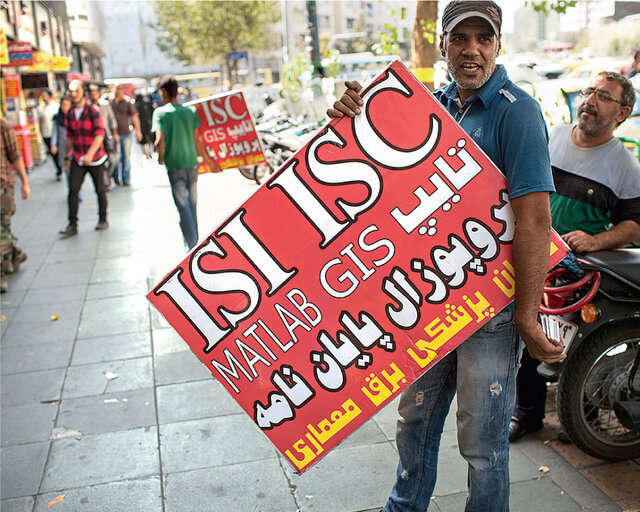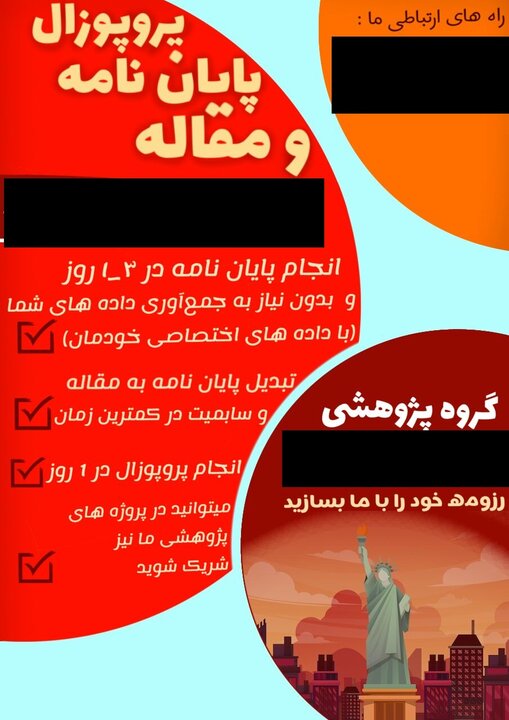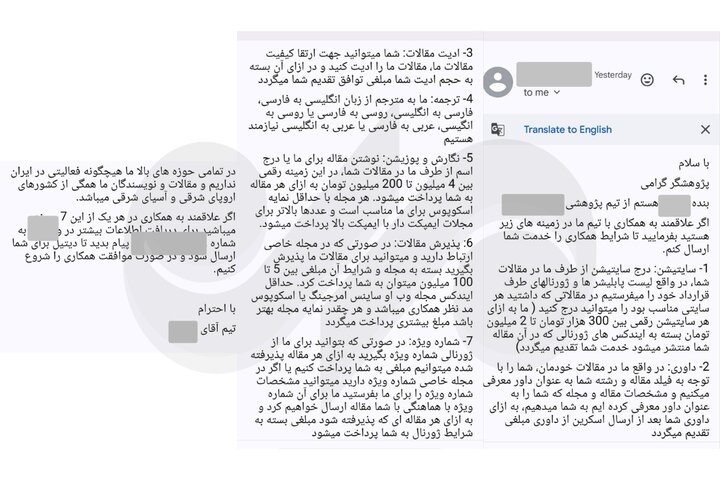– Department of Science and Technology, Saadane Tabatabainia: These days, an image of an email is circulating on social networks, which shows a corner of illegal and underground activities in the field of research.
This email, which was recently sent to a faculty member, shows a clear example of underground research misconduct. In this message, it is proposed to pay significant amounts in exchange for services such as the sale of writing positions, in exchange for citing articles, refereeing articles, and getting articles accepted in publications.
Selling writing positions for 4 to 200 million tomans per article; Payment of 300 thousand to 2 million tomans for each article cited; Payment of 5 to 100 million Tomans in exchange for accepting the publication of an article in a journal and payment of a fee in exchange for refereeing articles in magazines are among the proposals that have been presented to faculty members. In these economic conditions of the society, such offers may be tempting for anyone.
But this story is not a new thing; From years ago, centers for buying and selling essays and dissertations have been making headlines in the city, especially in the streets around the big universities and the Revolution Street. So that in 1395 “Richard Stone”; One of the journalists of the international magazine “Science” who came to Tehran, published a report on the sale of theses in Elkhebal Street in this international magazine. This report, which was published with the image below, made the fame of the paper sellers global in Iran.

In recent years, theses and essay centers, like other businesses, also pursue their activities on the Internet, and some of them are operating as an underground and informal network. The existence of these underground networks and the occurrence of such violations not only endangers the scientific and moral credibility of researchers; Rather, it has a negative effect on the scientific position as well as public trust in the country’s science and research system.
Research violations or misconduct can appear in different forms. Fraud in data such as changing, manipulating or creating data in order to achieve desired results, plagiarism or using the ideas and data of others without citing, shadow writing or ghost writing (meaning the participation of people in writing articles in exchange for money or… without mentioning their names) in the list of authors); Publishing repeated articles in several publications or presenting at conferences, deleting some research results, including the names of people who did not participate in the research in the list of authors, etc. are among the violations that researchers may commit in the research process.
Dealing with scientific misconduct in the world
Of course, it should be noted that the occurrence of research violations is not unique to Iran, and researchers all over the world may be tempted to commit scientific violations for various reasons, including the pressure to publish articles, etc., but various institutions in the leading countries in the field of science and technology They have a special sensitivity towards the issue of observing scientific ethics, preventing research misconduct, maintaining scientific integrity and research integrity. Because observing scientific ethics can lead to an increase in the quality of scientific productions, it prevents the weakening of the scientific credibility of countries in international forums, it strengthens honesty, transparency, trust and cooperation in the scientific community, and by observing the material and moral rights of researchers, it causes an increase It motivates them. In addition to all these things, it will ultimately increase people’s trust in science.
For this reason; Different countries seek to reduce scientific misconduct with different measures; The use of different software to identify scientific plagiarism by reputable scientific publications, the formation of regulatory bodies to monitor the observance of ethical principles in research (such as the ORI organization in America), the activity of non-governmental and independent institutions to monitor the publication of articles and increase transparency, international cooperation and Establishing ethical frameworks and guidelines to deal with plagiarism and falsified data (by institutions such as COPE or the Committee on Ethics in Publishing) as well as enforcing strict rules by publishers of scientific articles; It is one of the measures taken in the world to prevent and deal with scientific frauds.
Was the legislation to deal with fraud successful?
In Iran, in 2016, the law to prevent and deal with fraud in the preparation of scientific works was approved in the Islamic Council, and two years after that, in 2018, the executive regulations of this law were approved by the Cabinet of Ministers. According to this law, violations and fraud in the preparation of scientific works by natural and legal persons were criminalized, and duties were set for the main custodians of higher education in the country, namely the Ministry of Science and the Ministry of Health, with the aim of preventing and dealing with violations and fraud in the preparation of scientific works.
The law of preventing and dealing with fraud in the preparation of scientific works starts with the promotion, obligation and supervision of researchers and can lead to the disciplinary punishment of student expulsion or cancellation of thesis and dissertation, as well as the demotion of the faculty member, dismissal and contract cancellation. This law foresees tasks such as promoting a culture of respect for intellectual property, closely monitoring the observance of these rights, registering and comparing theses and articles (to prevent duplication and academic plagiarism) and imposing disciplinary punishment on violators.
Two years after the approval of the law on preventing and combating fraud, its executive regulations were also approved by the cabinet in 2018, and since then, research ethics working groups have been established to monitor and follow up on violations in universities and research institutions, requiring the registration of theses and dissertations in The registration system for the integration of research documents and matching of documents to prevent duplication of work and theft of science is being done in Irandak’s matching system, which will be done in the future performance reports. We will check them.
But in addition to all the measures taken and despite the existence of legislation to deal with scientific violations, the circulation of such messages in social networks and messengers shows that the legislation as it should and perhaps could not prevent these violations.

Warning of the Minister of Science to illegal centers
In this regard, not long ago Dr. Hossein Simai Saraf; In a conversation with Mehr’s reporter, the Minister of Science said about pursuing the issue of research violations, confronting centers for buying and selling articles and theses, and implementing the law on preventing and dealing with fraud in the preparation of scientific works, he said: “During this period, he has seriously pursued the responsibility of implementing this law.” And we give enough warning about collecting institutions that are active against the law.
In response to the question whether the fraud prevention and combating law needs to be amended or revised, he said: The existing law is a good law, but unfortunately there are problems in its implementation. We hope that we can implement the law well with the cooperation of the police force.
From low-quality professors and students to the lack of research infrastructure
Dr. Shahin Akhundzadeh; The vice president of research and technology of the Ministry of Health also said in a conversation with the Mehr reporter about the existence of these scientific violations: “Unfortunately, these issues exist.” The reason is that when we get a low-quality student, we don’t have a research infrastructure, we don’t provide research support, and we have a low-quality professor and university, the result is that someone else writes this student’s article.
Regarding the plan for the research and technology department of the Ministry of Health to prevent these violations, he said: We are taking action through the legal department and also the protection of the Ministry of Health in this regard, but to be honest, these actions are just a waste of money.
The vice president of research and technology of the Ministry of Health said about the supervisory role of ethics committees in research: ethics committees definitely deal with these cases, but these cases happen outside universities. If these committees notice such cases and observe that articles have been written with this procedure, they will deal with them.
Fraud proposal to students and high-ranking officials
Dr. Samad Nejad Ebrahimi; Director General of Policy and Planning Office of Research Affairs of the Ministry of Science In a conversation with Mehr’s reporter, while confirming the existence of such issues, he said: This email has been sent widely and en masse to various people, from students to high-ranking officials. We informed this matter to the Legal Vice-Chancellor of the Ministry of Science to follow up on this issue.
He pointed out: according to the protocols, the legal assistant is in contact with the judicial officers, and for this reason, they should pursue this issue through the judicial authorities.
FATA police should follow up the sending of these emails
According to the Director General of the Policy and Planning Office of Research Affairs; The sending of this email and these messages should be followed up through the police force and FATA police to determine who sent this message.
He said about these advertisements: There are many such messages. We are trying to solve these problems, but the field of research and technology of the country is struggling with various issues. Various issues from the livelihood of people to the weakness and lack of research infrastructures, the reduction of scientific exchanges as a result of sanctions and currency fluctuations, scientific frauds, are putting pressure on the thin body of research and technology in the country from all sides.
When a young faculty member is at the beginning of his career, he has a small salary and it is difficult for him to make ends meet; They may be tempted by these issues.
Referring to the problems in the field of research in the country, Nejad Ebrahimi said: livelihood problems of researchers, faculty members and students is one of the issues that play a role in this field. When a young faculty member is at the beginning of his career, his salary is low and it is difficult for him to make ends meet; They may be tempted by these issues. Of course, this does not mean that the young faculty members are involved in scientific violations.
In response to the question of whether ethics committees in research are able to detect their violations, the Director General of the Research Planning and Policy Office said: In some cases, they can be detected, and if they are not detected by these committees, international systems such as Scopus and Web of Science monitors them, and one of the reasons for retracting or discrediting articles on the same topic is networked and unrelated citations using citations; Therefore, these issues are recognized in the global arena.
Buying and selling articles is not plagiarism
Dr. Safar Begzadeh, lawyer, basic lawyer of a judiciary and assistant professor of Iran Research Institute of Science and Information Technology (Irandac), in a conversation with Mehr reporter, about the legal treatment of theses and essay sales centers and the legal follow-up of essay shop advertisements, first of all, the definition of plagiarism He pointed out and said: Plagiarism happens when someone publishes all or part of the work without the permission of the owner of the work. Buying and selling articles is not considered plagiarism by itself, but it can be classified as scientific misconduct or misconduct.
He added: “Unfortunately, in our laws, scientific misconduct has not been defined in a specific way, along with its various examples, and no special punishment has been defined for it.” Of course, if we criminalize this act and set a punishment for it, the important question is who can complain about this behavior? Do we need a private plaintiff or a public plaintiff?
This lawyer, who in two separate and independent researches in Irandak investigated the legal issues of “scientific plagiarism” and “shadow copying of academic works”, expressed the difference between shadow copying and academic plagiarism and said: in the first part of the law on preventing and dealing with fraud in the preparation of scientific works (approved on 31/5/1396), which was compiled in the form of a single article, it is stated:Preparing, offering or handing over works such as treatises, dissertations, articles, research plans, books, reports or other written or recorded research-scientific or artistic works, both electronic and non-electronic, by any natural or legal person for profit and As a profession or occupation, with the aim of presenting the whole work or a part of it by another as one’s own work, it is a crime and the perpetrator or perpetrators, in addition to depositing the funds received into the government treasury, are subject to punishment as follows are…». The behavior described in this unit is mainly examined under the title of “ghostwriting”; Although there is no mention of this term in the law.
Essay selling is an example of shadow writing
He explained in the definition of shadow writing: Shadow writing means that a person writes a work in exchange for receiving money or any financial or credit equivalent, and this work is published in the name of the person who paid the money or gave the compensation. Therefore, plagiarism is different from plagiarism.
This basic lawyer added: In shadow writing, there is an agreement between the shadow writer and the person who benefits from this work, and what is the subject of the agreement can be the writing of a thesis or an article or the translation of a foreign work. However, plagiarism, as taking another’s work without permission, is criminalized in the law on protecting the rights of authors and artists (approved on 11/10/1348).
Regarding Article 23 of the Law on Protection of Authors and Artists’ Rights, Begzadeh said: “In this law, the punishment for such a thief is specified as follows: “Anyone who publishes or distributes or presents all or part of another work protected by this law in his own name or in the name of the creator, without his permission or knowingly and intentionally in the name of someone other than the creator, shall be subject to disciplinary imprisonment of three The month will be sentenced to 1.5 years».
Referring to the reason for passing the law on preventing and combating fraud years after the law on protecting the rights of authors and artists, he explained: The reason for the lateness of the law on preventing and combating fraud in the preparation of scientific works is that plagiarism is a newer phenomenon than plagiarism. It is common in our universities, and at least in Tehran, some people are engaged in this work, especially in the Revolution Square and of course in the virtual space.
Where does the legal pursuit of article sales reach?
Referring to the problems of the fraud prevention and countering law, Begzadeh said: In this law, some actions have been excluded from the cases of shadow writing. For example, note 5 of this law says:The provision of services that are normally performed by third parties during the preparation of research-scientific and artistic works, such as laboratory services, typing, assistance in data collection, translation, reproduction and editing of works, are not subject to the provisions of this law.“; While some of these behaviors are exactly behaviors that can be examples of shadow writing or shadow writing and the behaviors mentioned at the top of the single article of 2016 are done in their shadow.
He pointed out: Unfortunately, when these behaviors are out of the definition of shadow writing, it is no longer possible to see the crime in a person’s behavior, but the criminal intent must be proven.
This lawyer explained about the conditions for proving the crime of shadow writing: To prove the crime, usually two conditions are necessary: firstly, the agreement between the person and the other party must be proven, and secondly, the work must be published in the name of a person who is not the real author or creator. If these two conditions are proven, this behavior can be prosecuted as shadow writing according to the law.
The problem of proving claims in buying and selling articles; When the plaintiff withdraws from the complaint
He also pointed to the problem of proving a claim in this context and said: In criminal law, the criminal intent of a person must be proven, and if it cannot be proven, filing a lawsuit will lead to the issuance of a restraining order.
A member of Irandak’s faculty explained by citing an example: for example, translators or statistical analysts may claim that they were unaware of the intention of the other party to publish the article, and of course, according to the regulations we have in the procedure, in principle, the person who claims must make his claim. to prove and the prosecution is usually in support of the “principle of innocence” according to which no one is guilty unless proven otherwise. If the plaintiff cannot prove the claim of plagiarism or plagiarism and the accused is acquitted, he can file a lawsuit against the original plaintiff as defamation and insult, and this issue is one of the reasons that prevent many people from filing lawsuits against the perpetrators of such scientific misconduct. discourages
He continued: If the plaintiff cannot prove the claim of plagiarism or plagiarism and the defendant is acquitted, he can file a lawsuit against the original plaintiff as defamation and insult, and this issue is one of the reasons that prevent many people from filing lawsuits against criminals. This kind of scientific misconduct discourages.
Begzadeh emphasized: these advertisements cannot be pursued, unless a person (whether natural or legal) files a complaint against another person (whether natural or legal) as a private plaintiff or the prosecutor enters as a public prosecutor and these advertisements to prosecute In the law on preventing and dealing with fraud, according to what is taken from note 3 and 4 of this article, the task of following up and taking action regarding such behaviors is mainly entrusted to the Ministry of Science and the Ministry of Health.
With such a law, criminal punishment and crime prevention do not happen
Referring to the defects of the Law on Prevention and Combating Fraud, this lawyer said: This law has not been able to define its intended legal concept well, and the notes that exclude certain behaviors are ambiguous. These notes have changed the criminal behavior from an objective and kind state to a subjective and personal one, in which the criminal intent of the person must be proven in each case.
Criticizing this law, he said: This law has defined the crime with many restrictions and clauses and made it very difficult to prove. As a result, the punishment of the criminal and the prevention of the crime do not happen, which makes the criminals more aggressive.
The law of preventing and dealing with fraud needs to be amended
In response to the question of whether the said law needs to be amended, this assistant professor of Irandak said: This law as well as its executive regulations (approved on 5/23/2018) should be amended; And with the effective participation of people who, while having a deep knowledge of intellectual property rights, consider shadow writing to be a dangerous and harmful scientific misconduct for the scientific reputation of the country.
He also said about the problems of pursuing private complaints about shadow writing or scientific plagiarism: In these lawsuits, the fees of experts are so high that many people give up on pursuing complaints. It seems that the government should reduce expert fees and other legal fees in such lawsuits, which have the color of an attack on the country’s cultural rights and scientific reputation, so that private plaintiffs can easily pursue their rights.
In the end, Begzadeh emphasized: The legislator should clearly show the ugliness of criminal behavior and determine appropriate and enforceable punishment for them. Otherwise, the number of criminals will increase and the validity of the law will be seriously doubted.
A self-governing scientific institution can maintain its own norms
In addition to these issues, some professors emphasize the need to strengthen scientific communities and the independence of universities to maintain the internal mechanisms of science to prevent scientific misconduct and state that the signs of the destruction of the internal mechanisms of science can be seen in scientific and financial misconduct.
Dr. Keyvan Elesti; A Ph.D. student in the philosophy of science and a member of the faculty of the Institute of Scientific Policy Research of the country, emphasizing the importance of the “autonomy” of the institution of science, told Mehr reporter: Of course, one should not be too surprised by the decline of science in the meaning of science, because relationships, interactions, and norms Internal science is only formed in institutions that have a percentage of self-management in them.
According to Elsti; Self-governing scientific institutions are also institutions with self-regulation; That is, like an organism or a living being, if it is damaged (or its norms are disturbed), it can repair itself in a certain period of time and return to “normal” conditions.
This PhD student in philosophy of science said about the characteristics of university independence or self-governance: When we talk about the independence or self-governance of the university, it means that this institution should have the ability to make its decisions, policies, programs and administrative events within the university as much as possible. The university itself and with a consultative mechanism should determine its own values and norms (which are scientific norms) and have its own accreditation system. and finally have the ability to self-regulate.
The legal deputy of the Ministry of Science did not respond
According to Mehr, despite many efforts to contact the legal department of the Ministry of Science to follow up on this issue and the judicial process of selling theses and articles, we have not succeeded in talking with the relevant authorities and getting information about how to deal with these violators.
Despite the laws and efforts made to deal with scientific violations, the evidence shows that criminal networks are operating under the skin of scientific centers and these measures have not been able to create an effective deterrent against these violations.
To deal with such scientific violations, the first step is to closely monitor the state of the country’s research system. In the next stage, the importance of accepting this issue is highlighted; To accept that such misbehavior exists in society and measures should be taken to deal with it. In addition to this, amending laws and clarifying regulatory processes, strengthening scientific communities and the independence of universities can also contribute to reducing these abuses in the long term.
Serious legal pursuit of scientific violations is the desire of all people who are doing honorable research activities with many difficulties and despite many problems; Because if a serious decision is not taken against these violations, public mistrust of science and the activities of researchers will intensify and the right of ethical researchers who strive to maintain scientific health despite shortcomings will be lost.
RCO NEWS















